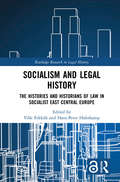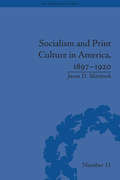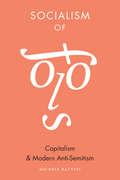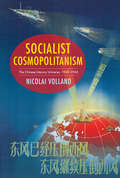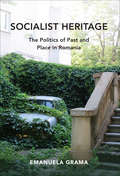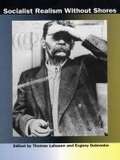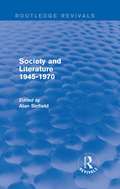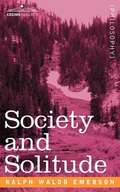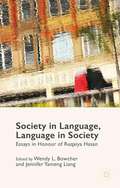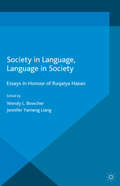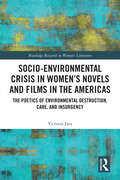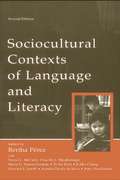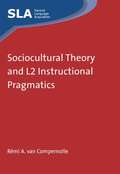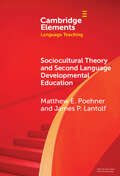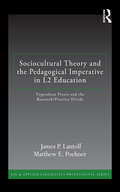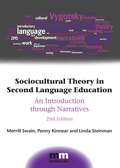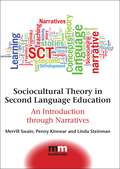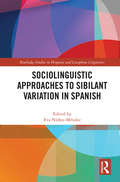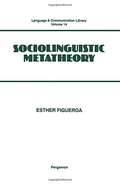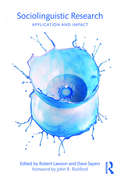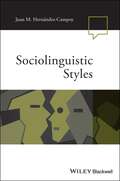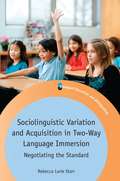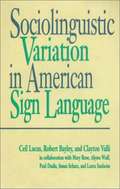- Table View
- List View
Socialism and Legal History: The Histories and Historians of Law in Socialist East Central Europe (Routledge Research in Legal History)
by Ville Erkkilä Hans-Peter HaferkampThis book focuses on the way in which legal historians and legal scientists used the past to legitimize, challenge, explain and familiarize the socialist legal orders, which were backed by dictatorial governments. The volume studies legal historians and legal histories written in Eastern European countries during the socialist era after the Second World War. The book investigates whether there was a unified form of socialist legal historiography, and if so, what can be said of its common features. The individual chapters of this volume concentrate on the regimes that situate between the Russian, and later Soviet, legal culture and the area covered by the German Civil Code. Hence, the geographical focus of the book is on East Germany, Russia, the Baltic states, Poland and Hungary. The approach is transnational, focusing on the interaction and intertwinement of the then hegemonic communist ideology and the ideas of law and justice, as they appeared in the writings of legal historians of the socialist legal orders. Such an angle enables concentration on the dynamics between politics and law as well as identities and legal history. Studying the socialist interpretations of legal history reveals the ways in which the 20th century legal scholars, situated between legal renewal and political guidance gave legitimacy to, struggled to come to terms with, and sketched the future of the socialist legal orders. The book will be a valuable resource for academics and researchers working in the areas of Legal History, Jurisprudence and Philosophy of Law and European Studies.
Socialism and Print Culture in America, 1897–1920 (The History of the Book #11)
by Jason D MartinekFor socialists at the turn of the last century, reading was a radical act. This interdisciplinary study looks at how American socialists used literacy in the struggle against capitalism.
Socialism of Fools: Capitalism and Modern Anti-Semitism
by Michele BattiniIn Socialism of Fools, Michele Battini focuses on the critical moment during the Enlightenment in which anti-Jewish stereotypes morphed into a sophisticated, modern social anti-Semitism. He recovers the potent anti-Jewish, anticapitalist propaganda that cemented the idea of a Jewish conspiracy in the European mind and connects it to the atrocities that characterized the Jewish experience in the nineteenth and twentieth centuries.Beginning in the eighteenth century, counter-Enlightenment intellectuals and intransigent Catholic writers singled out Jews for conspiring to exploit self-sustaining markets and the liberal state. These ideas spread among socialist and labor movements in the nineteenth century and intensified during the Long Depression of the 1870s. Anti-Jewish anticapitalism then migrated to the Habsburg Empire with the Christian Social Party; to Germany with the Anti-Semitic Leagues; to France with the nationalist movements; and to Italy, where Revolutionary Syndicalists made anti-Jewish anticapitalism the basis of an alliance with the nationalists. Exemplified best in the Protocols of the Elders of Zion, the infamous document that "leaked" Jewish plans to conquer the world, the Jewish-conspiracy myth inverts reality and creates a perverse relationship to historical and judicial truth. Isolating the intellectual roots of this phenomenon and its contemporary resonances, Battini shows us why, so many decades after the Holocaust, Jewish people continue to be a powerful political target.
Socialist Cosmopolitanism: The Chinese Literary Universe, 1945-1965 (Studies of the Weatherhead East Asian Institute, Columbia University)
by Nicolai VollandSocialist Cosmopolitanism offers an innovative interpretation of literary works from the Mao era that reads Chinese socialist literature as world literature. As Nicolai Volland demonstrates, after 1949 China engaged with the world beyond its borders in a variety of ways and on many levels—politically, economically, and culturally. Far from rejecting the worldliness of earlier eras, the young People's Republic developed its own cosmopolitanism. Rather than a radical break with the past, Chinese socialist literature should be seen as an integral and important chapter in China's long search to find a place within world literature. Socialist Cosmopolitanism revisits a range of genres, from poetry and land reform novels to science fiction and children's literature, and shows how Chinese writers and readers alike saw their own literary production as part of a much larger literary universe. This literary space, reaching from Beijing to Berlin, from Prague to Pyongyang, from Warsaw to Moscow to Hanoi, allowed authors and texts to travel, reinventing the meaning of world literature. Chinese socialist literature was not driven solely by politics but by an ambitious—but ultimately doomed—attempt to redraw the literary world map.
Socialist Heritage: The Politics of Past and Place in Romania (New Anthropologies Of Europe Ser.)
by Emanuela GramaThis prize-winning study of post-WWII Romania examines the fraught relationship between national heritage and Socialist statecraft.In Socialist Heritage, ethnographer and historian Emanuela Grama explores the socialist state’s attempt to create its own heritage, as well as the ongoing legacy of that project. While many argue that the socialist regimes of Central and Eastern Europe aimed to erase the pre-war history of the socialist cities, Grama shows that the communist state in Romania sought to exploit the past for its own benefit. The book traces the transformation of Bucharest’s Old Town district from the early twentieth century into the twenty-first. Under socialism, politicians and professionals used the district’s historic buildings—especially the ruins of a medieval palace—to emphasize the city’s Romanian past and erase its ethnically diverse history. Since the collapse of socialism, the cultural and economic value of the Old Town has become highly contested. Its poor residents decry their semi-decrepit homes, while entrepreneurs see it as a source of easy money. Such arguments point to recent negotiations about the meanings of class, political participation, and ethnic and economic belonging in today’s Romania. Grama’s rich historical and ethnographic research reveals the fundamentally dual nature of heritage: every search for an idealized past relies on strategies of differentiation that can lead to further marginalization and exclusion.Winner of the 2020 Ed A. Hewitt Book Prize
Socialist Heritage: The Politics of Past and Place in Romania (New Anthropologies Of Europe Ser.)
by Emanuela GramaThis prize-winning study of post-WWII Romania examines the fraught relationship between national heritage and Socialist statecraft.In Socialist Heritage, ethnographer and historian Emanuela Grama explores the socialist state’s attempt to create its own heritage, as well as the ongoing legacy of that project. While many argue that the socialist regimes of Central and Eastern Europe aimed to erase the pre-war history of the socialist cities, Grama shows that the communist state in Romania sought to exploit the past for its own benefit. The book traces the transformation of Bucharest’s Old Town district from the early twentieth century into the twenty-first. Under socialism, politicians and professionals used the district’s historic buildings—especially the ruins of a medieval palace—to emphasize the city’s Romanian past and erase its ethnically diverse history. Since the collapse of socialism, the cultural and economic value of the Old Town has become highly contested. Its poor residents decry their semi-decrepit homes, while entrepreneurs see it as a source of easy money. Such arguments point to recent negotiations about the meanings of class, political participation, and ethnic and economic belonging in today’s Romania. Grama’s rich historical and ethnographic research reveals the fundamentally dual nature of heritage: every search for an idealized past relies on strategies of differentiation that can lead to further marginalization and exclusion.Winner of the 2020 Ed A. Hewitt Book Prize
Socialist Realism without Shores
by Evgeny Dobrenko Thomas LahusenSocialist Realism without Shores offers an international perspective on the aesthetics of socialist realism--an aesthetic that, contrary to expectations, survived the death of its originators and the demise of its original domain. This expanded edition of a special issue of the South Atlantic Quarterly brings together scholars from various parts of the globe to discuss socialist realism as it appears across genres in art, architecture, film, and literature and across geographic divides--from the "center," Russia, to various points at the "periphery"--China, Germany, France, Poland, remote republics of the former USSR, and the United States.The contributors here argue that socialist realism has never been a monolithic art form. Essays demonstrate, among other things, that its literature could accommodate psychoanalytic criticism; that its art and architecture could affect the aesthetic dictates of Moscow that made "Soviet" art paradoxically heterogeneous; and that its aesthetics could accommodate both high art and crafted kitsch. Socialist Realism without Shores also addresses the critical discourse provoked by socialist realism--Stalinist aesthetics, "anthropological" readings; ideology critique and censorship; and the sublimely ironic approaches adapted from sots art, the Soviet version of postmodernism.Contributors. Antoine Baudin, Svetlana Boym, Greg Castillo, Katerina Clark, Evgeny Dobrenko, Boris Groys, Hans Günther, Julia Hell, Leonid Heller, Mikhail Iampolski, Thomas Lahusen, Régine Robin, Yuri Slezkine, Lily Wiatrowski Phillips, Xudong Zhang, Sergei Zimovets
Society and Literature 1945-1970 (Routledge Revivals)
by Alan SinfieldFirst published in 1983, this book focuses on the twentieth-century writer as both a product, and an interpreter, of his or her society. It explores the social basis of our conceptions of literature and the ways in which writing is affected by the media, institutional and technical, through which it reaches readers. The text looks at experiences of the period in terms of domestic and world affairs, sexuality, and philosophical and religious attitudes. It discusses the social and economic structures which specifically affect the act of writing, and considers the dominant developments of the period in three genres: novels, poetry and writing for theatre.
Society and Solitude
by Ralph Waldo EmersonPerhaps no writer has so dramatically shaped the course of American philosophy as Ralph Waldo Emerson, whose meditations on spirituality, freedom, and the power of knowledge have informed and inspired generations of activists, scholars, and common people. <P><P>Published in 1870, Society and Solitude is Emerson's last great work, a collection of lectures he delivered on tour, in which he found profound insight on such seemingly prosaic topics as Art, Eloquence, Domestic Life, Books, Courage, Success, and "A man builds a fine house; and now he has a master, and a task for life; he is to furnish, watch, show it, and keep it in repair, the rest of his days," says Emerson in his lecture here on "Works and Days." Such penetrating wit and American poet and philosopher Ralph Waldo Emerson (1803-1882) was a driving force behind the Transcendental Movement of the early 18th century. <P>[This text is listed as an example that meets Common Core Standards in English language arts in grades 11-12 at http://www.corestandards.org.]
Society in Language, Language in Society: Essays in Honour of Ruqaiya Hasan
by Wendy L. Bowcher Jennifer Yameng LiangThis collection of original articles covers a range of research connecting with the work of the eminent linguist Ruqaiya Hasan. It contains contributions from M.A.K. Halliday, G. Williams, D. Butt, D. Miller and M. Berry among others, an interview with Ruqaiya Hasan, and notes from the contributors about their connection with Ruqaiya Hasan's work.
Society in Language, Language in Society: Essays in Honour of Ruqaiya Hasan
by Wendy L. Bowcher Jennifer Yameng LiangThis collection of original articles covers a range of research connecting with the work of the eminent linguist Ruqaiya Hasan. It contains contributions from M.A.K. Halliday, G. Williams, D. Butt, D. Miller and M. Berry among others, an interview with Ruqaiya Hasan, and notes from the contributors about their connection with Ruqaiya Hasan's work.
Socio-Environmental Crisis in Women’s Novels and Films in The Americas: The Poetics of Environmental Destruction, Care, and Insurgency (Routledge Research in Women's Literature)
by Victoria JaraThe climate crisis has reached a critical point, necessitating urgent global action. Women’s activism against environmental dispossession in the Americas manifests not only in protests and classrooms but also through artistic filmmaking and writing. This book focuses on the overlooked contributions of women filmmakers and novelists, highlighting how their work reveals the connections between environmental dispossession and various injustices related to gender, ethnicity, age, class, and labor. It demonstrates that contemporary women in the Americas engage deeply with ecological issues, analyzing their representations and identifying common principles across texts. Using an interdisciplinary approach from environmental humanities, gender and Indigenous studies, and film and literary studies, the author compares works from Canada and Latin America. Three poetics emerge: environmental destruction critiques harmful development; care expands notions of reciprocity beyond the human; and insurgency showcases struggles against extractivist models. These works invite readers to understand the complex interconnections of environmental justice within society.
Sociocultural Contexts of Language and Literacy
by Bertha Pérez Howard L. Smith Teresa L. McCarty Lucille J. Watahomigie To Thi Dien Ji-Mei Chang Aurelia Dávila Amy NordlanderSociocultural Contexts of Language and Literacy, Second Edition engages prospective and in-service teachers in learning about linguistically and culturally diverse students, and in using this knowledge to enrich literacy learning in classrooms and communities. The text is grounded in current research and theory that integrate sociocultural and constructivist concepts and perspectives and provide a framework teachers can use to develop strategies for teaching reading, writing, and thinking to diverse students. The focus on English literacy development does not imply advocacy for "English only" or ESL as the primary mode of literacy instruction. Rather, the authors take the position that learners need to develop literacy in their native language and that the concepts and skills learned in developing the native language create a foundation of strength from which students can develop English literacy. Part I introduces relevant research and language learning theories. Part II provides research reviews and information about literacy learning within specific culturally and linguistically diverse communities. The chapters in Part III challenge the reader to view the multiple social, intellectual, cultural, and language differences children bring to the classroom as an opportunity for learning and building on the diversity among students. Activities and suggested readings at the end of each chapter involve readers in reflection, observation, meaning making, and the construction of application processes for their new understandings. New in the Second Edition:*updated research and theory on multilingual and second language literacy;*a focus on the interpretation of these research findings to make them useful for teachers and teacher educators in understanding and articulating the research bases for literacy practices; *attention to current intensely debated issues, such as standards, the phonics movement, and high-stakes testing; and*new activities and suggested readings.
Sociocultural Theory and L2 Instructional Pragmatics
by Rémi A. van CompernolleThe book outlines a framework for teaching second language pragmatics grounded in Vygotskian sociocultural psychology. The framework focuses on the appropriation of sociopragmatic concepts as psychological tools that mediate pragmalinguistic choices. Using multiple sources of metalinguistic and performance data collected during a six-week pedagogical enrichment program involving one-on-one tutoring sessions, the volume explores both theoretical and practical issues relevant to teaching second language pragmatics from a Vygotskian perspective. The book represents an important contribution to second language instructional pragmatics research as well as to second language sociocultural psychology scholarship. It will be of interest to all those researching in this field and to language teachers who will find the pedagogical recommendations useful.
Sociocultural Theory and Second Language Developmental Education (Elements in Language Teaching)
by Matthew E. Poehner James P. LantolfSociocultural Theory (SCT), as formulated by Russian psychologist L. S. Vygotsky nearly a century ago, is distinct among traditions in the field of second language (L2) studies in its commitment to praxis. According to this view, theory and research provide the orienting basis for practice, which in turn serves as a testing ground for theory (Vygotsky, 1997). This Element offers a synthesis of foundational concepts and principles of SCT and an overview of two important areas of praxis in L2 education: Concept-Based Language Instruction, which organizes language curricula around linguistic concepts, and Dynamic Assessment, a framework that integrates teaching and diagnosing learner L2 abilities. Leading approaches to L2 teacher education informed by SCT are also discussed. Examples from studies with L2 teachers and learners showcase praxis in action, and emerging questions and directions are considered.
Sociocultural Theory and the Pedagogical Imperative in L2 Education: Vygotskian Praxis and the Research/Practice Divide (ESL & Applied Linguistics Professional Series)
by James P. Lantolf Matthew E. PoehnerExplicating clearly and concisely the full implication of a praxis-oriented language pedagogy, this book argues for an approach to language teaching grounded in a significant scientific theory of human learning—a stance that rejects the consumer approach to theory and the dichotomy between theory and practice that dominates SLA and language teaching. This approach is based on Vygotsky’s sociocultural theory, according to which the two activities are inherently connected so that each is necessarily rooted in the other; practice is the research laboratory where the theory is tested. From the perspective of language education, this is what is meant by the ‘pedagogical imperative.’ Sociocultural Theory and the Pedagogical Imperative in L2 Education• Elaborates a new approach to dealing with the relationship between theory and practice—an approach grounded in praxis—the dialectical unity of theory and practice• Presents an analysis of empirical research illustrating praxis-based principles in real language classrooms • Brings together cognitive linguistics and sociocultural theory ─ the former provides the theoretical knowledge of language required of praxis and the latter furnishes the theoretical principles of learning and development also called for in a praxis approach• Offers recommendations for redesigning teacher education programs Its timely focus on the theory-practice gap in language education and its original approach to bridging it put this book at the cutting edge of thinking about Vygotskian sociocultural theory in applied linguistics and SLA.
Sociocultural Theory in Second Language Education
by Merrill Swain Penny KinnearIn this accessible introduction to Vygotskyian sociocultural theory, narratives illuminate key concepts of the theory. These key concepts, addressed across seven chapters, include mediation; Zone of Proximal Development; collaborative dialogue; private speech; everyday and scientific concepts; the interrelatedness of cognition and emotion, activity theory and assessment. An eighth chapter provides readers with an opportunity to consider two additional narratives and apply the SCT concepts that they have become familiar with. These narratives come from individuals in a variety of languages, contexts, ages and proficiencies. We hear from learners, teachers and researchers. Intended for graduate and undergraduate audiences, this textbook includes controversies in the field, questions for collaborative discussion and provides references to important work in the literature of second language teaching, learning and research.
Sociocultural Theory in Second Language Education: An Introduction Through Narratives
by Merrill Swain Penny Kinnear Linda SteinmanIn this accessible introduction to Vygotskyian sociocultural theory, narratives illuminate key concepts of the theory. Intended for graduate and undergraduate audiences, this textbook includes controversies in the field, questions for collaborative discussion and provides references to important work in the literature of second language teaching, learning and research.
Sociolinguistic Approaches to Sibilant Variation in Spanish (Routledge Studies in Hispanic and Lusophone Linguistics)
by Eva Núñez-MéndezSocial processes and the nature of language variation have driven sibilant variation across the Spanish-speaking world. This book explores the current state of Spanish sibilants and their dialectal variations. Focusing on different processes undergone by sibilants in Spanish (e.g., voicing, devoicing, weakening, aspiration, elision) in various geographical areas and language contact situations, each chapter offers an analysis on a unique sociolinguistic case from different formal, experimental, and data-based approaches. The opening chapter orients the reader with an overview of sibilant system’s evolution, which serves as an anchor to the other chapters and facilitates understanding for readers new to the topic. The volume is organized around three thematic sections: part one, Spain; part two, United States; and part three, Central and South America. The collection includes research on dialects in both Peninsular and Trans-Atlantic Spanish such as Jerezano, Caribbean Spanish in Boston and New York City, Cuban Spanish in Miami, Colombia-Barranquilla Spanish, northern Buenos Aires Argentine Spanish, and USA heritage Spanish, among other case studies. This volume offers an original and concise approach to one of the most studied variables in Spanish phonetics, taking into account geographically-based phonetic variation, sociolinguistic factors, and various Spanish language contact situations. Written in English, this detailed synthesis of the wide-ranging geolinguistic features of Spanish sibilants provides a valuable resource for scholars in Hispanic studies, linguistics, Spanish dialectology and sociolinguistics.
Sociolinguistic Fieldwork
by Natalie SchillingLooking for an easy-to-use, practical guide to conducting fieldwork in sociolinguistics? This invaluable textbook will give you the skills and knowledge required for carrying out research projects in 'the field', including: • How to select and enter a community • How to design a research sample • What recording equipment to choose and how to operate it • How to collect, store and manage data • How to interact effectively with participants and communities • What ethical issues you should be aware of. Carefully designed to be of maximum practical use to students and researchers in sociolinguistics, linguistic anthropology and related fields, the book is packed with useful features, including: • Helpful checklists for recording techniques and equipment specifications • Practical examples taken from classic sociolinguistic studies • Vivid passages in which students recount their own experiences of doing fieldwork in many different parts of the world
Sociolinguistic Metatheory (Language & Communication Library #14)
by Esther FigueroaLinguistics is a discipline with ever expanding boundaries and interests. Despite the narrow definition of linguistics which dominates academia, sub-fields continue to flourish and ways of doing linguistics continue to expand. As ways to do linguistics increase, and as approaches to linguistics accumulate over time, it becomes increasingly necessary for students of linguistics to have ways of understanding and comparing developments in linguistics. <p><p> Sociolinguistic Metatheory is a book which explains foundational developments in linguistics by taking the past three decades of developments in sociolinguistics and relating them to contemporaneous developments in received linguistics. Sociolinguistic Metatheory takes the reader through the basic philosophical questions which drive linguistic research. It looks in detail at three models of sociolinguistics - Dell Hymes and the Ethnography of Communication, William Labov and Sociolinguistic Realism, and John Gumperz and Interactional Sociolinguistics - and focuses on such questions as: Where is language located? How is an utterance-based approach to linguistics different from a sentence-based approach? How do metatheoretical paradigm assumptions such as realism or relativism affect the development of linguistic theory? What interesting developments in linguistic theory and analysis have sociolinguistics provided?
Sociolinguistic Research: Application and Impact
by Robert Lawson Dave SayersShortlisted for the LSA Leonard Bloomfield Book Award 2017 Sociolinguistic Research: Application and Impact provides a unique overview of international research projects, showcasing their positive outcomes and offering critical insights and constructive critiques into the meaning of ‘impact’ in contemporary research. The book includes: original findings from cutting-edge research from scholars such as Mary Bucholtz, Walt Wolfram and Peter Patrick; coverage of organisational contexts including education, government, justice, heritage, and the workplace; activities including after-school programmes, workplace training courses, social media campaigns, and video productions; application of research to professional practice including teaching (primary school to university), adjudication, police interviewing, and governmental policymaking; contributors’ personal reflections on the research process and its outcomes, including constructive critiques of institutional definitions of impact. With chapters spanning research across five continents, Sociolinguistic Research: Application and Impact is essential reading for sociolinguistic researchers, students embarking on sociolinguistic research, and anyone interested in the practical application of research on language and society.
Sociolinguistic Styles
by Juan Manuel Hernández-CampoySociolinguistic Styles presents a new and in-depth, historically rooted overview of the phenomenon of style-shifting in sociolinguistic variation. Written by an internationally acclaimed expert in the field, the text explores why, where and when it occurs. Full examination of the complex phenomenon of style-shifting in sociolinguistics, focusing on its nature and social motivations, as well as on the mechanisms for its usage and its effects In-depth, up-to-date critical overview of the different theoretical approaches accounting for stylistic variation, exploring their historical roots not only in sociolinguistics and stylistics or semiotics but also in classical fields such as rhetoric and oratory Coverage of a wide range of related concepts and issues, from the oldest Greek ethos and pathos or Roman elocutio and pronuntiatio to the contemporary enregisterment, stylisation, stance, or crossing Written by an academic who has been instrumental in developing theory in this area of sociolinguistics
Sociolinguistic Variation and Acquisition in Two-Way Language Immersion: Negotiating the Standard
by Rebecca Lurie StarrThis book investigates the acquisition of sociolinguistic knowledge in the early elementary school years of a Mandarin-English two-way immersion program in the United States. Using ethnographic observation and quantitative analysis of data, the author explores how input from teachers and classmates shape students' language acquisition. The book considers the different sociolinguistic messages conveyed by teachers in their patterns of language use and the variety of dialects negotiated and represented. Using analysis of teacher speech, corrective feedback and student language use, the author brings together three analyses to form a more complete picture of how children respond to sociolinguistic variation within a two-way immersion program.
Sociolinguistic Variation in American Sign Language
by Ceil Lucas Robert Bayley Clayton ValliThis volume provides a complete description of ASL variation. People from varying regions and backgrounds have different ways of saying the same thing. For example, in English some people say "test," while others say "tes'," dropping the final "t. " Noted scholars Ceil Lucas, Robert Bayley, and Clayton Valli led a team of exceptional researchers in applying techniques for analyzing spoken language variation to ASL. Their observations at the phonological, lexical, morphological, and syntactic levels demonstrate that ASL variation correlates with many of the same driving social factors of spoken languages, including age, socioeconomic class, gender, ethnic background, region, and sexual orientation. Internal constraints that mandate variant choices for spoken languages have been compared to ASL as well, with intriguing results.
